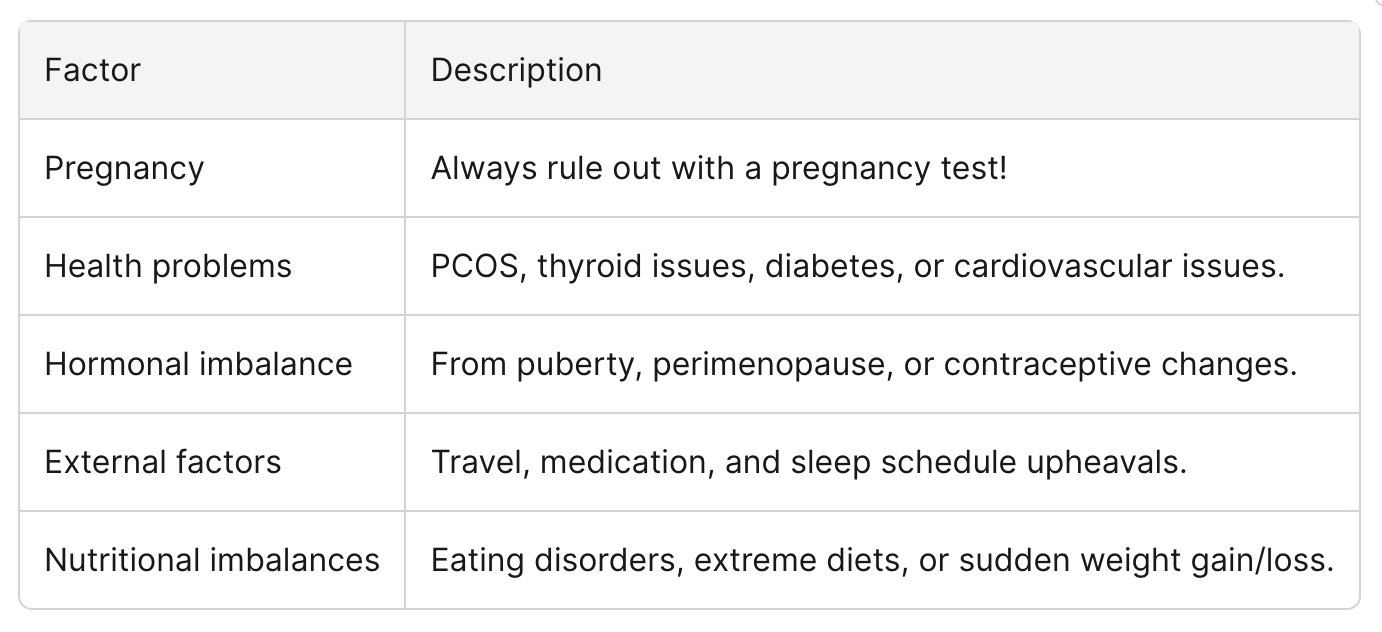Feeling frazzled and wondering where your period went? You’re not alone—can stress delay periods is one of the most common questions gynaecologists get from women of all ages. The menstrual cycle is a finely tuned symphony orchestrated by reproductive hormones, and sometimes, life’s greatest stressors can throw the conductor right off the podium.
Let’s explore how stress affects your menstrual cycle, why your periods sometimes pull a disappearing act, and what you can do to reclaim your rhythm.
How Stress Affects Your Menstrual Cycle
The Stress Response and Your Body
When you’re facing big life events—lost keys or that existential dread—your body produces cortisol, the infamous “stress hormone.” This triggers a stress response, priming you to flee from tigers, survive meetings, or endure family dinners. However, your menstrual cycle isn’t immune to these adrenaline-fueled emergencies.
The Role of Cortisol and Hormonal Balance
Cortisol secretion interferes with the brain’s hypothalamus, which helps coordinate your reproductive hormone production. If you’re experiencing chronic stress, this disruption can result in an irregular period, a delayed period, or your period skipping town altogether.
- Acute Stress: May delay your period by a few days or a week.
- Severe Chronic Stress: Can send your cycle into chaos, causing missed or late periods that last for months.
Psychological Stress vs. Physical Stress
When we talk about the ways life can impact your menstrual cycle, it’s common to think first of physical factors—an intense workout regimen, illness, or a change in diet. But psychological stress is just as powerful, and often even sneakier, in disrupting the body’s finely tuned hormonal balance.
How Psychological Stress Impacts Hormonal Health
- Emotional Roller Coasters: Worry, anxiety, frequent mood swings, and persistent emotional strain can tilt your reproductive hormones off balance, affecting ovulation and the regularity of your periods.
- Stress Hormone Cascade: The brain responds to psychological stress in much the same way it would to a physical threat. It releases cortisol, the “stress hormone,” which interferes with the hypothalamus and pituitary—key players in controlling the menstrual cycle.
- Real-World Effects: Long work hours, relationship angst, exam pressures, or financial anxiety are not just “in your head”—they’re real stressors that your body translates into hormonal chaos.
Physical Stress Isn’t the Only Culprit
While illness, injury, sudden weight changes, or strenuous exercise are obvious physical stressors, emotional and psychological pressures play a similarly disruptive role. It’s not just “what you’re eating” or “if you exercised enough”—your emotional well-being, coping strategies, and how you process daily stressors are equally vital.
Why Both Types Matter for Your Cycle

Can Stress Delay Periods? (And For How Long?)
Stress is not just a mental or emotional experience—it has effects that ripple through the entire body, including the delicate hormonal ballet that orchestrates your menstrual cycle. Both short bursts of anxiety (“why is my boss emailing at midnight?”) and sustained emotional turmoil (“am I living in a Netflix drama?”) can disrupt your period, resulting in delays, irregularity, or missed cycles altogether.
Why Does Stress Delay or Disrupt Periods?
When you undergo stress—whether psychological (such as anxiety or emotional upheaval) or physical (like illness or over-exercising)—your body responds by increasing production of cortisol, the primary stress hormone. Cortisol can interfere with the hypothalamus, a brain region essential for regulating the reproductive hormones needed for a regular menstrual cycle. This interference can:
- Delay ovulation
- Causes of missed or late periods
- Lead to irregular or long menstrual cycles.
- In extreme cases, this can result in hypothalamic amenorrhea (where periods stop entirely for months).
How Long Can Stress Delay Your Period?
The duration and impact of a stress-related delay vary depending on the type, duration, and severity of stress:
Short-Term Stress
Even transient stressors—say, preparing for a big exam or experiencing relationship drama—can push back your period by a few days. A delay of 5–7 days is commonly reported after acute stress. During these times, cortisol temporarily disrupts the hormonal cascade necessary for ovulation, causing a late period that typically returns to normal once the stress subsides.
Chronic or Severe Stress
When stressful periods drag on for weeks or months (think major life upheavals, grief, or workplace burnout), the body’s response becomes chronic. Sustained high levels of cortisol can:
- Causes irregular cycles
- This leads to missed periods spanning several months.
- Result in your period stopping altogether (hypothalamic amenorrhea), especially in sensitive individuals or those already under physiological strain (athletes, those with low body weight, etc.).
When Should You Seek Medical Attention?
While stress is a common and often reversible reason for missed or delayed periods, it’s crucial not to dismiss more serious underlying conditions.
Red Flags Requiring Medical Attention
- Missed more than two cycles in a row (with a negative pregnancy test)
- Periods have stopped without an obvious or resolved stressor.
- Additional symptoms, such as unexplained weight changes, persistent fatigue, digestive issues, or hair loss, may also appear.
Chronic disruptions could signal health problems such as:
- Polycystic Ovary Syndrome (PCOS): Often includes irregular periods, excess hair growth, and acne.
- Thyroid Disorders: Both underactive and overactive thyroid conditions affect menstrual regularity.
- Other Reproductive or Systemic Issues: Diabetes, pituitary disorders, or early menopause may present with irregular or missed periods.
Even if you suspect stress as the culprit, a healthcare provider can help rule out these possibilities and offer guidance on restoring hormonal balance.
The Science: Why Stress Affects Your Menstrual Cycle
How Stress Disrupts Hormone Production
When stress levels are high, cortisol levels rise. This throws off the body’s ability to maintain proper hormone production and hormonal balance—think of it as static on your cycle’s radio frequency.
Effects of Elevated Cortisol on the Reproductive System
- Ovulation Delayed: Stress can delay ovulation or prevent it entirely.
- Menstrual Irregularities: You may experience missed, delayed, or long periods, increased cramps, and mood swings due to hormonal imbalance.
- Additional Symptoms: Digestive issues, weight gain or loss, sleep schedule disturbances, and more can also result from stress’s impact on hormonal health.
Common Triggers: What Causes a Stress Delay in Periods?
External and Internal Factors
- Big Life Events: Bereavement, job changes, exams, moving house.
- Physical Symptoms: Illness, excessive exercise, drastic weight changes.
- Other Factors: Lack of quality sleep, skipping meals, substance use, and even over-caffeination.
Birth Control and Hormonal Imbalance
Certain contraceptives and hormonal changes can either mitigate or magnify the effect stress has on your menstrual cycle.
Beyond Stress: Other Causes of Missed or Late Periods
Before blaming stress for every missed or late period, it’s important to consider these other factors:

How to Manage Stress and Prevent Delayed Periods
Coping Strategies To Reduce Stress
- Identify Stressors: Keep a journal of moods, symptoms, and big life events.
- Develop Coping Abilities: Mindfulness, meditation, herbal teas, and regular exercise.
- Maintain a Quality Sleep Schedule: Avoiding screens before bed and getting 7–9 hours.
- Support Hormonal Health: Eat balanced meals, practice self-care, and foster supportive relationships.
- Medical Attention: If you experience consistently irregular periods, severe mood swings, long periods, or physical symptoms like weight changes or digestive issues, consult a healthcare professional to rule out underlying causes like PCOS.
When to Take Action
- Missed two or more cycles? See a provider, especially if you have negative pregnancy tests, as chronic stress or more serious health problems may need additional services and treatment options to restore hormonal balance.
Wrapping Up: Your Menstrual Cycle, Your Wellbeing
Many women experience late or missed periods during stressful times. Remember, your cycle is your body’s way of whispering (and sometimes shouting) about your overall health, especially your stress levels. Managing stress is as essential as tracking your periods—think of it as emotional birth control for your cycle’s calendar.
- Prioritise mental and hormonal health.
- Learn your body’s ability to bounce back.
- Call in additional services and treatment options when needed.
So next time you’re wondering, “Can stress delay periods?”, remember: stress isn’t just in your head, it can show up in your cycle too. The good news? With the right coping abilities—rest, nourishment, support, and perhaps a cup of herbal tea—you can guide your menstrual cycle back on track.

.png)
.png)



